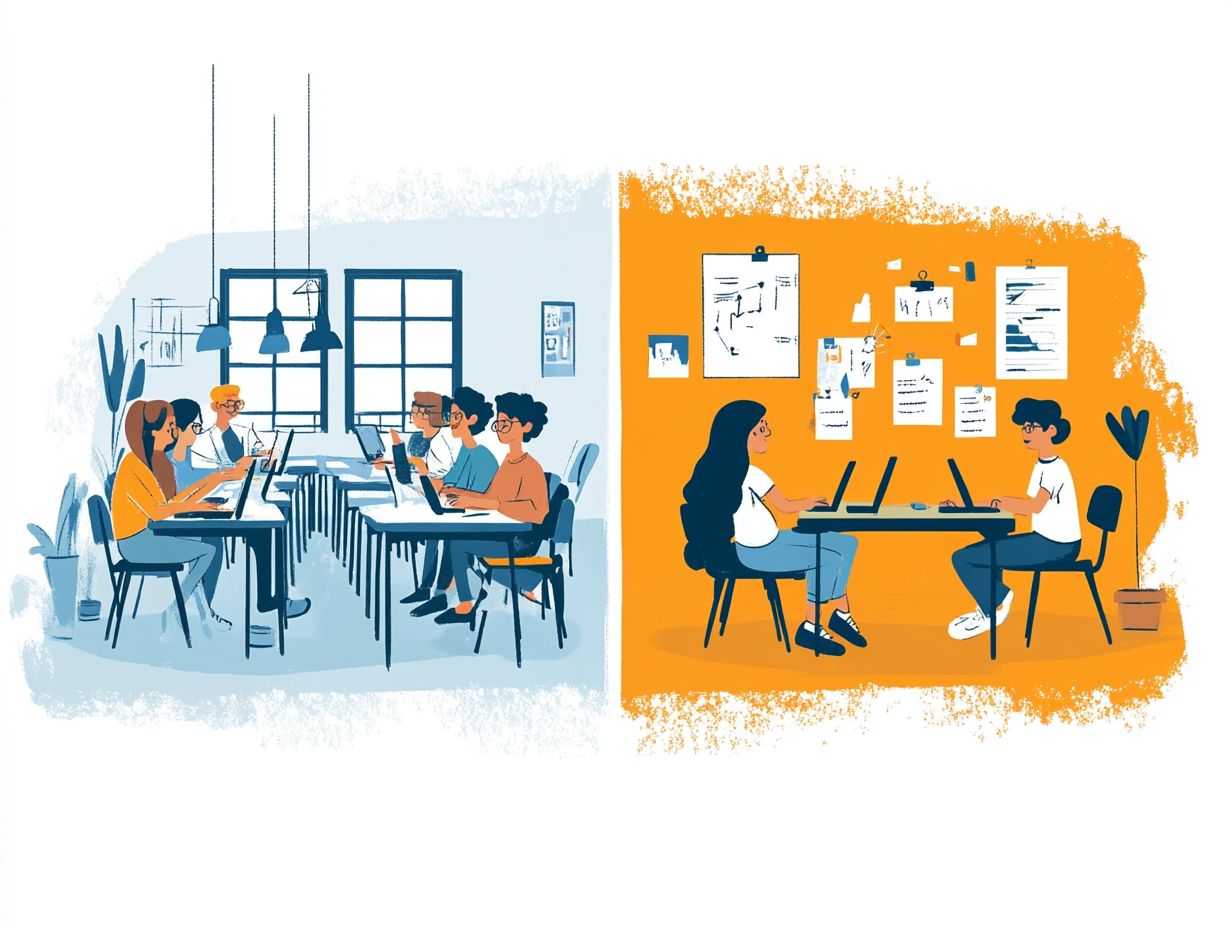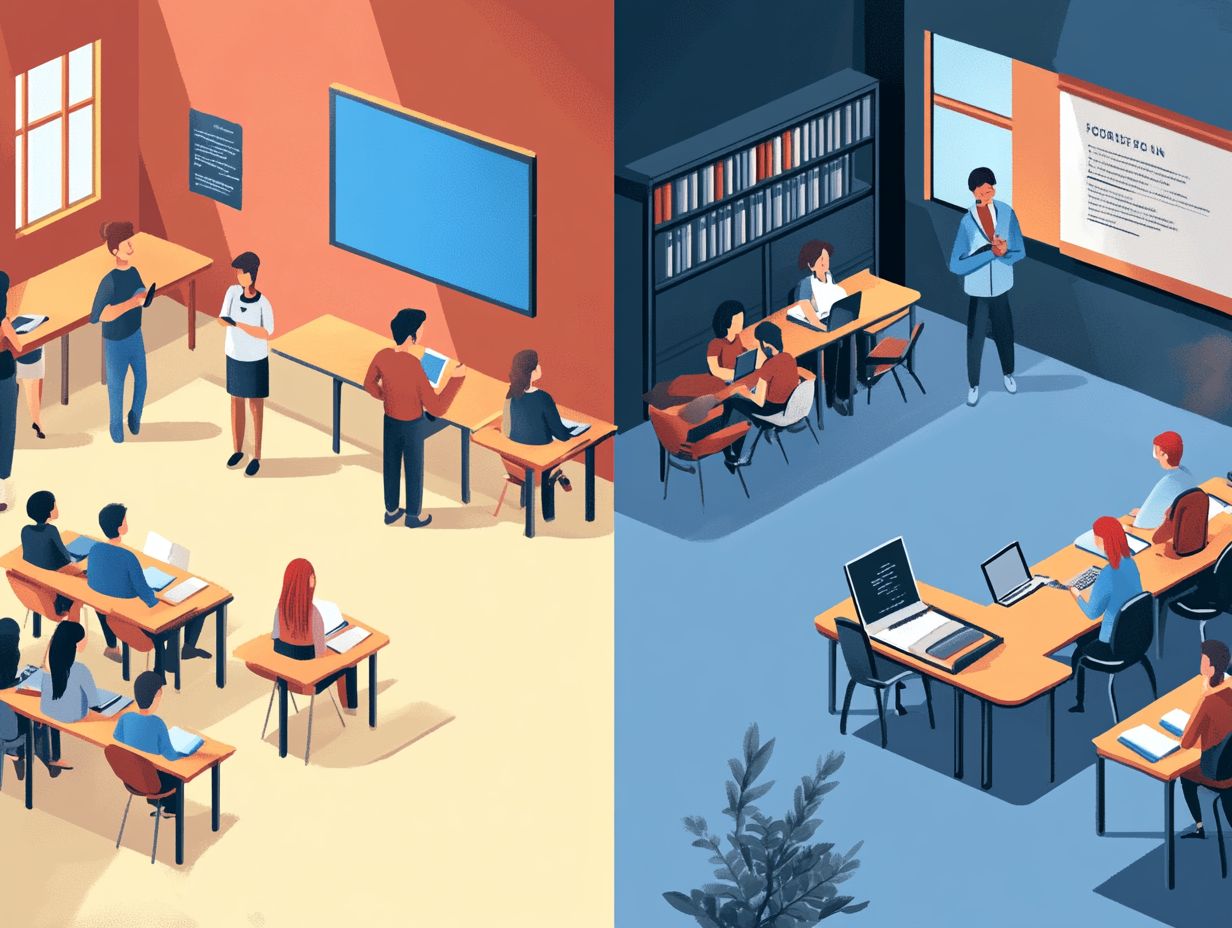3 Key Differences between Online and Traditional Degrees
As education transforms, the debate between online and traditional degrees becomes increasingly pronounced. Each learning modality presents distinct advantages tailored to various lifestyles and career ambitions.
This exploration delves into three critical distinctions: flexibility and convenience, cost and affordability, and the learning environment and resources at your disposal. It will also tackle common misconceptions, employer perceptions of online degrees, and the pros and cons of each path.
Whether you’re a busy professional juggling multiple responsibilities or a recent high school graduate stepping into the world of higher education, understanding these elements will help you confidently choose the right path for your education!
Contents
- Key Takeaways:
- 1. Flexibilidad y Conveniencia
- 2. Cost and Affordability
- 3. Learning Environment and Resources
- Is an Online Degree as Valuable as a Traditional Degree?
- Frequently Asked Questions
- What are the main differences between online and traditional degrees?
- What is the mode of instruction for online degrees?
- What is the mode of instruction for traditional degrees?
- How does the flexibility of online degrees differ from traditional degrees?
- What is the learning environment like for online degrees?
- Is the learning environment different for traditional degrees?
Key Takeaways:

Online degrees offer flexibility and convenience, making it easier for you to manage work and studies.
They can also be more affordable due to lower tuition fees and fewer additional costs.
Online programs focus on technology and self-paced learning, while traditional degrees provide face-to-face instruction.
1. Flexibilidad y Conveniencia
The rise of online degrees has transformed the higher education landscape, providing you with unmatched flexibility and convenience. Now, you can pursue your academic aspirations while juggling work, family, and personal commitments.
With prestigious institutions like Cambridge University and the University of the People at the forefront, online programs offer many learning options designed for your lifestyle, making education accessible regardless of where you are.
This innovative approach allows you to customize your study schedule, seamlessly integrating coursework into your daily routine. The ability to attend classes whenever it suits you means you can advance your career while managing personal responsibilities, all without compromising the quality of your education.
A strong support system enhances your online learning experience, providing assistance at every turn when challenges arise. Supportive resources, such as academic advising and tutoring, further bridge the gap, creating a nurturing environment that gives you the power to thrive.
2. Cost and Affordability
When you’re contemplating the pursuit of an online degree, cost and affordability become crucial factors. It’s vital to explore options like financial aid and tuition-free programs that align with your educational goals.
In today s fast-paced educational landscape, comparing the total costs of online degrees to traditional ones reveals striking differences that can significantly impact your financial journey.
Tuition fees for online programs often come in lower than those at brick-and-mortar institutions, as they eliminate many extra costs, such as commuting and on-campus housing. You can even save on textbooks and materials by leveraging easily accessible digital resources.
Educators stress the importance of diving into various financial aid opportunities, including scholarships, grants, and work-study programs. These options give you the power to reduce expenses and make smart investments in your academic future.
3. Learning Environment and Resources
The learning environment for online programs is carefully designed to improve your learning experience. You’ll find a treasure trove of resources, including technical support and digital library services, essential for creating a truly effective distance learning experience.
Beyond these foundational elements, you have access to many interactive learning tools aimed at deepening your understanding and enhancing knowledge retention. These tools can range from virtual simulations to discussion forums and multimedia presentations, enabling you to interact with the material in vibrant and dynamic ways.
With comprehensive digital library services at your fingertips, you can dive into a wealth of scholarly articles, textbooks, and research databases, giving you the power to conduct independent study and research with confidence.
By seamlessly integrating these resources, the online learning environment not only bolsters your individual study efforts but also fosters a sense of community and collaboration among students, enriching the overall learning journey.
Is an Online Degree as Valuable as a Traditional Degree?

As the educational landscape shifts, you might wonder if an online degree is as valuable as a traditional one. This question is important for employer recognition, academic standards, and job opportunities in today s competitive market.
Employers are placing greater emphasis on the quality of educational programs rather than solely focusing on how you earned your degree. A recent survey indicated that 67% of employers regard the reputation of the institution as more significant than the mode of instruction.
While some may believe that online degrees lack academic standards, credible online programs often reflect the same high benchmarks as their traditional counterparts. Companies are appreciating the value of MOOCs (Massive Open Online Courses). Reports suggest that candidates with certifications from these platforms demonstrate a proactive approach to learning a trait increasingly prized in today s fast-paced work environment.
How Do Employers View Online Degrees?
Employers are recognizing the value of online degrees, viewing them as credible alternatives to traditional degrees. This is especially true when the academic quality and rigor of the program are clear.
This shift is particularly apparent in industries like technology, healthcare, and business administration. In these fields, practical skills can outweigh formal educational credentials.
Factors such as flexibility, the ability to balance work and study, and the growing reputation of accredited online institutions contribute to this transformation.
Successful job placement services offered by certain universities play a crucial role in bridging the gap between graduates and potential employers. Testimonials from companies that have hired online degree holders reveal satisfaction with the readiness and adaptability of these candidates in real-world situations.
What Are the Pros and Cons of Online Degrees?
Online degrees present a blend of advantages and disadvantages. The flexibility and convenience are appealing, but they require a strong sense of self-motivation and discipline to thrive in a remote learning environment.
This approach allows you to craft a schedule that aligns with your personal and professional commitments. It makes education more accessible for even the busiest lives.
With online platforms at your fingertips, you can access high-quality resources from anywhere in the world. This effectively breaks down the geographical barriers that traditional education often encounters.
However, this freedom can be a double-edged sword. Many students struggle with the lack of a structured environment, leading to procrastination and feelings of isolation.
Additionally, the absence of immediate support from peers and instructors can amplify these challenges. It highlights the crucial need for cultivating personal discipline and responsibility in your self-directed learning journey.
What Are the Pros and Cons of Traditional Degrees?
Traditional degrees provide a distinctive campus experience that enhances networking opportunities and upholds a standard of academic rigor. However, you may face challenges such as scheduling conflicts and higher costs compared to online bachelor’s degrees and their pros and cons.
The numerous advantages of pursuing a degree in a traditional setting extend beyond academic learning. They include meaningful, in-person interactions that sharpen your interpersonal skills and forge lifelong connections.
Access to campus resources like libraries, laboratories, and extracurricular activities enriches your educational journey. These offer invaluable hands-on experiences that you simply can t replicate online.
Engaging directly with faculty allows you to receive personalized guidance and mentorship. This can help you navigate your academic and career paths more effectively.
However, it s crucial to weigh the potential downsides of traditional education. Limited flexibility in managing your time and rising tuition fees can leave you grappling with debt long after you toss your graduation cap in the air.
How Can One Decide Between an Online or Traditional Degree?

Deciding between an online or traditional degree involves careful consideration of various factors, including your educational goals, personal circumstances, and the impact of online education on traditional bachelor’s degrees, as well as the distinct career opportunities each pathway presents in today’s dynamic job market.
To make an informed choice, start by assessing your current situation. Take stock of your work commitments, financial resources, and family obligations.
Next, reflect on your career aspirations. Think about which format aligns best with your future goals.
For example, certain fields may place a premium on traditional degrees due to their perceived prestige. Other fields are recognizing the value of online degrees.
Your learning preferences also play an important role. If you thrive in structured environments, in-person classes may be the way to go. However, if you’re someone who learns well on their own, a virtual setup might be where you truly excel.
Ultimately, considering each option s impact on your long-term career growth and job opportunities will be essential in making a strategic decision.
What Are the Common Myths About Online Degrees?
Despite their increasing acceptance, several myths linger about online degrees that may cause you to hesitate when considering distance learning options.
These misconceptions often arise from outdated views of online education. Many still believe that degrees earned remotely lack rigor or are somehow inferior to their traditional counterparts.
Research shows that over 70% of employers find online degrees equally credible, as long as they come from accredited institutions. The emergence of reputable online programs has significantly reshaped this landscape, making it essential for you to distinguish between fact and fiction.
As the workforce evolves, embracing technology and flexible learning, the stigma surrounding online education continues to fade. Now, more people like you can confidently explore these great opportunities!
Frequently Asked Questions
What are the main differences between online and traditional degrees?
The main differences between online and traditional degrees include the mode of instruction, flexibility, and the learning environment, with the 3 key elements of online degree programs playing a crucial role in how students engage with their studies.
What is the mode of instruction for online degrees?

Online degrees provide instruction through digital platforms and virtual classrooms, allowing students to access course materials and lectures at any time and location.
What is the mode of instruction for traditional degrees?
Traditional degrees offer in-person instruction in a physical classroom setting, where students attend scheduled lectures and classes.
How does the flexibility of online degrees differ from traditional degrees?
Online degrees offer more flexibility in terms of scheduling and course completion, as students can access materials and complete assignments at their own pace. Traditional degrees typically have a more rigid schedule and require students to attend classes at specific times.
What is the learning environment like for online degrees?
The learning environment for online degrees is typically more independent and self-directed. Students are responsible for managing their own time and staying motivated to complete coursework. However, they also have access to virtual support and resources from their instructors and peers.
Is the learning environment different for traditional degrees?
Yes, the learning environment for traditional degrees is more structured and interactive. Students attend in-person classes and have face-to-face interactions with professors and classmates. This can be beneficial for those who prefer a more traditional classroom setting and thrive in a collaborative learning environment.






